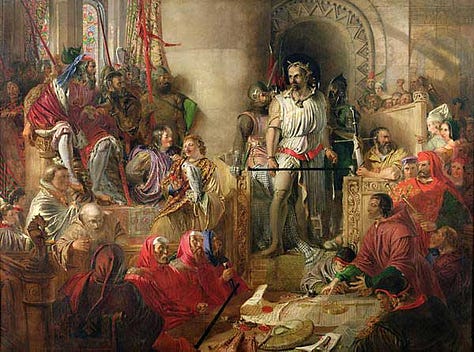#OTD in 1305 Sir William Wallace was captured by Sir John Menteith, near Glasgow, and sent to London for execution. It is virtually impossible to cut through the fug of emotion and revisionism on this subject, but let us try anyway.
Menteith was acting as Sheriff of Dumbarton, at a time when most of the Scots nobles had submitted to Edward I. Wallace had been outlawed at the St Andrews parliament of February 1304, so Menteith was simply performing his office.
The Scots had surrendered in 1304 via the Strathord agreement, whereby they submitted to King Edward and agreed to re-swear their oaths of fealty. However, unlike in 1296, they surrendered on terms. In exchange Edward granted the Scots life and limb and the restoration of their lands, and gave some a role in his new goverment or 'Ordinance' for Scotland.
The exception was Wallace. Unlike every other Scot, he was only allowed to surrender unconditionally i.e. Edward could kill him if he felt like it. Unsurprisingly, Wallace preferred not to take the risk. One English chronicle claims he tried to surrender on terms, but was rejected.
By 1305 Wallace was a pariah, with no allies among the Scots or anyone else. The French had come to terms with Edward in 1303, so there was no hope of refuge in France. Wallace could do nothing except keep running.
When he was captured, not a single Scot tried to save him. Robert de Bruce, who had submitted to Edward in 1302 (two years before everyone else) was at Westminster when Wallace was brought in. If he did speak up, there is no record of it, and it did no good.
This was not a case of the Scots being too afraid of Edward to speak. For instance, when he threatened to execute James the Steward, they closed ranks and refused to let that happen. James was one of their own, a high-ranking nobleman. Wallace, by contrast, was nobody. If Menteith was a traitor - 'the false Menteith' - for serving up Wallace to Edward, then so was everyone else. I might get yelled at for saying such things, but this is the reality.
Wallace's savage execution does Edward no credit, obviously, but there was policy behind it. The long war in Scotland had (apparently) ended in a messy negotiation, which was no good for public relations. His English subjects wanted blood, and someone had to be the fall guy. Thus, Wallace was thrown to the mob.





